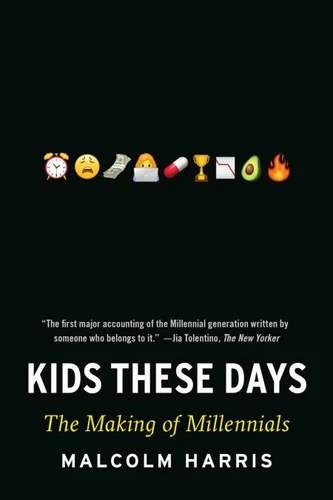Kids These Days. Human Capital and the Making of Millennials
Par :Formats :
Disponible dans votre compte client Decitre ou Furet du Nord dès validation de votre commande. Le format ePub protégé est :
- Compatible avec une lecture sur My Vivlio (smartphone, tablette, ordinateur)
- Compatible avec une lecture sur liseuses Vivlio
- Pour les liseuses autres que Vivlio, vous devez utiliser le logiciel Adobe Digital Edition. Non compatible avec la lecture sur les liseuses Kindle, Remarkable et Sony
- Non compatible avec un achat hors France métropolitaine
 , qui est-ce ?
, qui est-ce ?Notre partenaire de plateforme de lecture numérique où vous retrouverez l'ensemble de vos ebooks gratuitement
Pour en savoir plus sur nos ebooks, consultez notre aide en ligne ici
- Nombre de pages8
- FormatePub
- ISBN978-0-316-51087-5
- EAN9780316510875
- Date de parution06/11/2017
- Protection num.Adobe DRM
- Infos supplémentairesepub
- ÉditeurLittle, Brown and Company
Résumé
In Kids These Days, early Wall Street occupier Malcolm Harris gets real about why the Millennial generation has been wrongly stereotyped, and dares us to confront and take charge of the consequences now that we are grown up. Millennials have been stereotyped as lazy, entitled, narcissistic, and immature. We've gotten so used to sloppy generational analysis filled with dumb clichés about young people that we've lost sight of what really unites Millennials.
Namely: We are the most educated and hardworking generation in American history. We poured historic and insane amounts of time and money into preparing ourselves for the 21st-century labor market. We have been taught to consider working for free (homework, internships) a privilege for our own benefit. We are poorer, more medicated, and more precariously employed than our parents, grandparents, even our great grandparents, with less of a social safety net to boot.
Kids These Days is about why. In brilliant, crackling prose, early Wall Street occupier Malcolm Harris gets mercilessly real about our maligned birth cohort. Examining trends like runaway student debt, the rise of the intern, mass incarceration, social media, and more, Harris gives us a portrait of what it means to be young in America today that will wake you up and piss you off. Millennials were the first generation raised explicitly as investments, Harris argues, and in Kids These Days he dares us to confront and take charge of the consequences now that we are grown up.
Namely: We are the most educated and hardworking generation in American history. We poured historic and insane amounts of time and money into preparing ourselves for the 21st-century labor market. We have been taught to consider working for free (homework, internships) a privilege for our own benefit. We are poorer, more medicated, and more precariously employed than our parents, grandparents, even our great grandparents, with less of a social safety net to boot.
Kids These Days is about why. In brilliant, crackling prose, early Wall Street occupier Malcolm Harris gets mercilessly real about our maligned birth cohort. Examining trends like runaway student debt, the rise of the intern, mass incarceration, social media, and more, Harris gives us a portrait of what it means to be young in America today that will wake you up and piss you off. Millennials were the first generation raised explicitly as investments, Harris argues, and in Kids These Days he dares us to confront and take charge of the consequences now that we are grown up.
In Kids These Days, early Wall Street occupier Malcolm Harris gets real about why the Millennial generation has been wrongly stereotyped, and dares us to confront and take charge of the consequences now that we are grown up. Millennials have been stereotyped as lazy, entitled, narcissistic, and immature. We've gotten so used to sloppy generational analysis filled with dumb clichés about young people that we've lost sight of what really unites Millennials.
Namely: We are the most educated and hardworking generation in American history. We poured historic and insane amounts of time and money into preparing ourselves for the 21st-century labor market. We have been taught to consider working for free (homework, internships) a privilege for our own benefit. We are poorer, more medicated, and more precariously employed than our parents, grandparents, even our great grandparents, with less of a social safety net to boot.
Kids These Days is about why. In brilliant, crackling prose, early Wall Street occupier Malcolm Harris gets mercilessly real about our maligned birth cohort. Examining trends like runaway student debt, the rise of the intern, mass incarceration, social media, and more, Harris gives us a portrait of what it means to be young in America today that will wake you up and piss you off. Millennials were the first generation raised explicitly as investments, Harris argues, and in Kids These Days he dares us to confront and take charge of the consequences now that we are grown up.
Namely: We are the most educated and hardworking generation in American history. We poured historic and insane amounts of time and money into preparing ourselves for the 21st-century labor market. We have been taught to consider working for free (homework, internships) a privilege for our own benefit. We are poorer, more medicated, and more precariously employed than our parents, grandparents, even our great grandparents, with less of a social safety net to boot.
Kids These Days is about why. In brilliant, crackling prose, early Wall Street occupier Malcolm Harris gets mercilessly real about our maligned birth cohort. Examining trends like runaway student debt, the rise of the intern, mass incarceration, social media, and more, Harris gives us a portrait of what it means to be young in America today that will wake you up and piss you off. Millennials were the first generation raised explicitly as investments, Harris argues, and in Kids These Days he dares us to confront and take charge of the consequences now that we are grown up.






